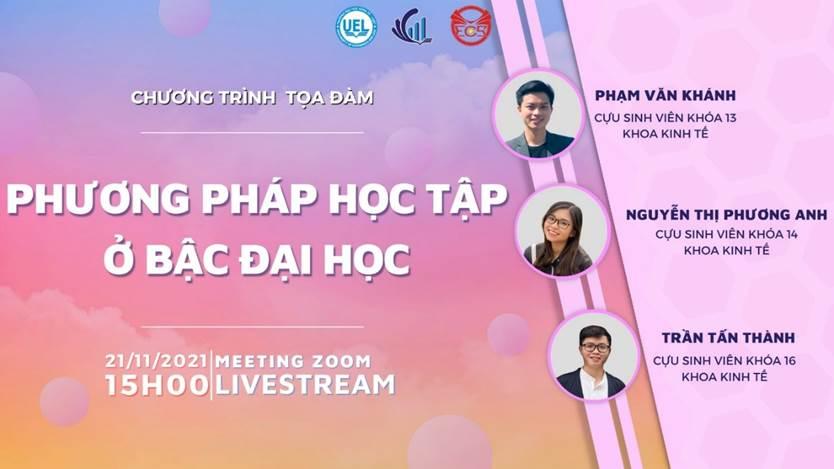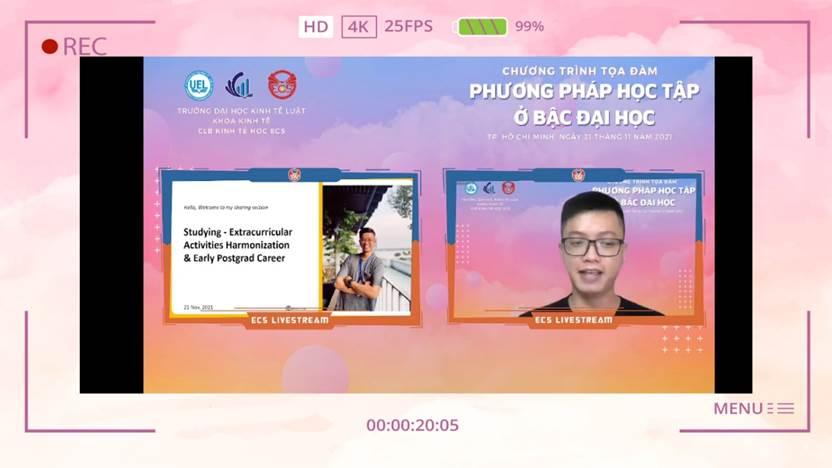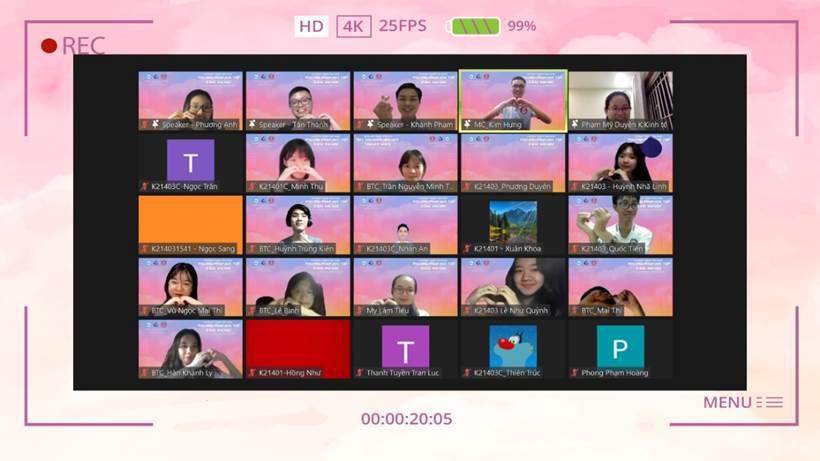On November 21, 2021, at 3:00 PM, the ECS Economics Club under the Faculty of Economics organized a panel discussion on Learning Methods and Training skills at the University level. The event was conducted online through Zoom Meeting and was livestreamed directly on the club's official fanpage.

The panel discussion had the participation of guest speakers, former students of the Economics Department at the University of Economics and Law, with impressive achievements, as well as the department's faculty and leadership. During the event, the guest speakers shared effective learning methods and practices in the classroom; and ways to help them overcome fear and pressure of scores. Right from the opening of applications, the discussion attracted more than 150 registrations from students.

Deputy Head of the Faculty of Economics - Ms. Pham My Duyen opened with an introduction to the discussion. This year, due to the complex COVID-19 situation, the discussion was held online but still ensured the content and essential knowledge for students to listen to the shared experiences and strategies for tackling challenging academic situations, balancing study and other activities, and accumulating skills in the university environment.

At the beginning of the sharing session, Mr. Pham Van Khanh, a former student of course 13 of the Faculty of Economics, introduced students to soft skills necessary for job applications and effective planning:
- You don't have to study well to be happy, you don't have to be happy to study well: Putting effort into studying is never a disadvantage, don't worry too much about applying for a job later. What you have to worry about is "learning, training, and experience”. Make an effort to enrich your account with knowledge and skills every day. However, don't just bury your head in the textbooks, classroom assignments, and the pressure of exams, those are necessary but not enough. The theoretical world and the real world are quite different, so you have to venture out to truly understand. Don't hesitate to join clubs, associations, etc. They are genuinely excellent environments for you to learn."
- The best learning method is the one you create for yourself: change your learning mindset from passive to active, have clear learning goals, build yourself a strong learning group, make a good impression on teachers, and read books to expand your knowledge.
- After graduating, you need to prepare knowledge, skills, experience and relationships.

Besides, when participating in the discussion, students also listened to Mr. Tran Tan Thanh, a former student of course 16, another speaker sharing how to balance time between studying and participating in clubs and groups:
- Divide study subjects into groups and create separate learning methods for each subject. Plan each year's GPA and future graduation type, seek experience from seniors.
- Define your activities when joining an organization. Don't let participation become an excuse to neglect your studies or be lazy.
- Each program you participate in a university environment will help you practice different pressures and develop different skills.

Understanding the concerns of students, the faculty also invited Ms. Nguyen Thi Phuong Anh, a former student of course 14, owner of the Eramus+ exchange scholarship with the University of Economics in Krakow, Poland to share about the opportunities and challenges when decided to become an international student. For Ms. Phuong Anh, learning English is sometimes not enough for those who are determined to study abroad. In addition, they also have to improve other foreign languages. In addition, she also introduced students to more sources of "hunting" for scholarships such as HannahED, which can be found in student emails and the website of the Foreign Relations Department, etc. These must be valuable experiences for those who intend to future study abroad direction.
After the interesting sharing of the guest speakers, there was a question-asking session from participating students. Many questions are raised related to learning issues and scores such as: "How to find a suitable advisor?", "Studying Economics can work in a variety of professions." No? Should I do an internship from my first year?",... which increased the heat of the discussion. That is not only your own concern but also the question of many other students and certainly, after listening to the speaker's answer, the participants have partly removed their concerns and many of you have also found answers. oriented for yourself.
The discussion ended with a Kahoot game brought by the guests themselves and extremely attractive gifts. It is not only a way to help participants reinforce the content but also increase the connection between speakers and attendees.


The discussion ended at 6:00 p.m. the same day.